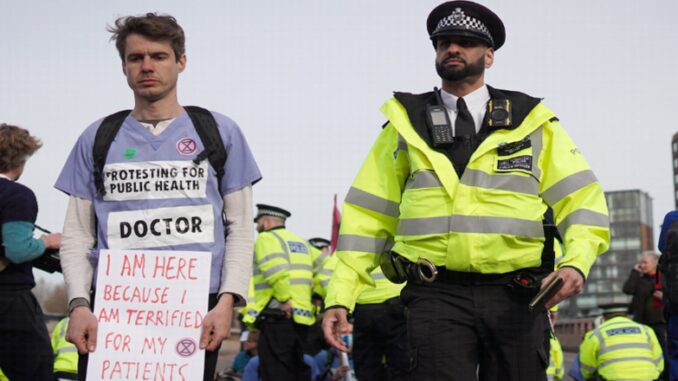
DUBAI, United Arab Emirates, December 3, 2023 (ENS) – On Sunday, the first Health Day at a United Nations climate summit, more than 40 million health professionals from around the world joined the call to action by the World Health Organization and civil society organizations to prioritize health in the climate negotiations at COP28 now taking place in Dubai.
The climate crisis is the biggest health threat humanity has ever faced, according to the World Health Organization, WHO. The UN health agency predicts an estimated 250,000 additional deaths per year from heat stress, malnutrition, dengue, malaria, and other vector-borne diseases between 2030 and 2050.
COP28 President Sultan Ahmed Al-Jaber said in a statement that climate-related factors “have become one of the greatest threats to human health in the 21st century.”
The COP28 host country United Arab Emirates and several charities at the UN climate summit on Sunday offered US$777 million in financing for eradicating tropical diseases that are expected to worsen as temperatures rise.
The pledges include $100 million from the UAE and another $100 million from the Bill and Melinda Gates Foundation.
Microsoft co-founder Gates told COP28 delegates at the World Climate Action Summit Friday, “Invest in innovations that save and improve the most lives. That starts with the technologies that will help us get to zero emissions, but it doesn’t end there. Our fight against climate change can’t come at the expense of fighting other threats to human welfare like food insecurity, malnutrition, and infectious diseases. We also need to support projects that help the most vulnerable people adapt to a warming world and continue our progress on improving global health.”
“When we invest in innovation that works for everyone, we won’t just keep the planet livable. We will make it a better place to live,” Gates said.
Climate inaction is costing lives and impacting health every day, say health workers who are demanding immediate and bold action to phase out fossil fuels, transition to clean energy, build resilience and to support people and communities most vulnerable to impacts of the changing climate.
“In the face of the urgent challenges posed by health and climate change, health professionals stand united in every effort to improve health outcomes and address the climate crises,” Director-General of the World Health Organization Dr. Tedros Adhanom Ghebreyesus said. “This inspires us all to contribute to a healthier, more resilient world for generations to come.”
The year 2023 has had a surge in climate-related disasters, including wildfires, heatwaves and droughts, leading to the displacement of whole populations, agricultural losses and heightened air pollution.
And WHO warns that the ongoing climate crisis has increased the risk of life-threatening diseases such as cholera, malaria and dengue.
Climate change has a disproportionate impact on the poorest and most vulnerable communities, exacerbating poverty, displacement, and lack of access to food and clean water. Neglected diseases, including leishmaniasis and sleeping sickness, will spread to new areas, affecting low- and middle-income countries the most.
Almost 99 percent of the world’s population breathes air that exceeds the WHO’s guidelines for air pollution, and the global health agency warns that outdoor air pollution driven by fossil fuel emissions kills more than four million people every year.
“It increases the risk of respiratory diseases, strokes, heart disease, lung cancer, diabetes and other health problems, posing a threat that has been compared to tobacco,” WHO says, emphasizing the “pressing need” to prioritize research and development for medicines, vaccines, and diagnostics for climate-sensitive diseases.
Global Health Mobilization at COP28 Moves Millions
Health Ministers from around the world today endorsed the COP28 Declaration on Climate and Health, supported by 120 countries.
The International Council of Nurses, with 30 million members, and the World Medical Association, with a membership of 10 million physicians, pledged their support, along with thousands of health professionals worldwide who have actively signed WHO’s call to action on health and climate change.
WHO and these 40 million health professionals are demanding that governments meet the commitments they have already made, deliver on the Paris Agreement, accelerate the phasing out of fossil fuels and raise their ambition for a healthier, fairer, and greener future for humanity.
Strong and resilient health systems are indispensable to protecting the population from the negative impacts of climate change on their health. Building climate-resilient, low-carbon health systems as protection for current and future lives must be seen as one of the priorities in local, national and global climate action and financing, WHO says.
This spotlights the severe health implications of climate change, emphasizes the critical role of the United Nations Framework Convention on Climate Change (UNFCCC) and, under it, the Paris Agreement, and underscores the urgent need to work collaboratively to confront the connections between climate change and health.
Climate Health Funders Given Guiding Principles
A consortium of multilateral development banks and funders, countries and philanthropies today published the Guiding Principles for Financing Climate and Health Solutions announced at the hiigh-level World Climate Action Summit during COP28.
While the COP28 Declaration on Climate and Health reflects a shared understanding of the urgency of climate action for health and raises hope of a greater global commitment to a healthier and more resilient future for all, the Guiding Principles establish a shared vision for financing that will rapidly reduce greenhouse gas emissions to improve health, protect people from climate risks to their health, and build resilient, sustainable health systems.
The Guiding Principles were developed by the COP28 Presidency in collaboration with The Global Fund to Fight AIDS, Tuberculosis, and Malaria, The Green Climate Fund, The Rockefeller Foundation, the World Health Organization and the ATACH Working Group on Financing, and in consultation with over 50 financing partners and civil society organizations.
The Guiding Principles have been endorsed by 41 organizations, with more expected to endorse them following COP28.
But funding for mitigation and adaptation at the climate-health intersection falls well short of need.
While over 90 percent of countries include health priorities in their Nationally Determined Contributions, the self-defined national climate pledges under the Paris Agreement, only 0.5 percent of multilateral climate funding is allocated to projects that explicitly address human health.
Likewise, global health funders have not integrated action to address climate change into their investments. The Guiding Principles build coherence and foster collaboration across funders to accelerate the allocation of finance for the countries and communities that need it most.
Financing Climate-resilient Health Systems
The commitment to a healthier planet requires a commitment to financing mechanisms that support climate-resilient health systems and sustainable initiatives, WHO explains. It is critical to discuss the urgency of action but also ensure that financial commitments match the scale of the challenge.
Currently receiving a mere 0.5 percent of global climate financing, the health sector needs a substantial increase in resources. With the health sector facing unprecedented challenges, urgent action is needed to bridge the stark financial gap. By multiplying funding, we strengthen the sector’s capacity to innovate, adapt and deliver optimal care, ensuring a resilient healthcare infrastructure for today’s challenges and the uncertainties of tomorrow, WHO says hopefully.
The UNFCCC estimates that global health adaptation will require US$26.8 billion to US$29.4 billion in funding annually by 2050.
Many low income countries are unable to provide basic health services, much less the investments needed to adapt services to unfolding climate risks, according to author Tilly Alcayna in a June 2023 article in the journal “PLOS Global Public Health.”
Alcayna and her co-authors are affiliated with the Red Cross Red Crescent Climate Centre in The Hague, The Netherlands; and also with the Centre on Climate Change & Planetary Health and the London School of Hygiene & Tropical Medicine, United Kingdom.
The World Bank estimates that by 2050 Sub-Saharan Africa will incur 80 percent of the global health costs from increased case burden of malaria and diarrheal disease. If health system adaptation is not prioritized, an increased health burden will contribute to the both the economic cost and non-economic loss and damage attributable to climate change.
WHO’s Climate and Health Commitment
WHO welcomes the efforts of the COP28 Presidency to highlight the health emergency and provide a high-level platform for climate and health at this conference, including though the inaugural Health Day, and the climate and health ministerial.
The WHO-led Alliance for Transformative Action on Climate and Health, ATACH, is a global platform that brings together more than 75 countries that have committed to initiatives on climate-resilient and low carbon sustainable health systems. The platform is promoted by the United Kingdom as President of COP26, held in Glasgow, Scotland along with partners, bilateral donors and researchers.
WHO will ensure that ATACH embraces the priorities included in the Declaration and supports its effective implementation.
Furthermore, WHO commits to strengthening its climate change and health portfolio by integrating climate change as a priority for all WHO programs through its core functions of leadership, evidence and country implementation. Finally, WHO affirms its commitment to global health and climate action, pledging its support to ministries of health worldwide.
Featured image:
© 2023, Environment News Service. All rights reserved. Content may be quoted only with proper attribution and a direct link to the original article. Full reproduction is prohibited.



